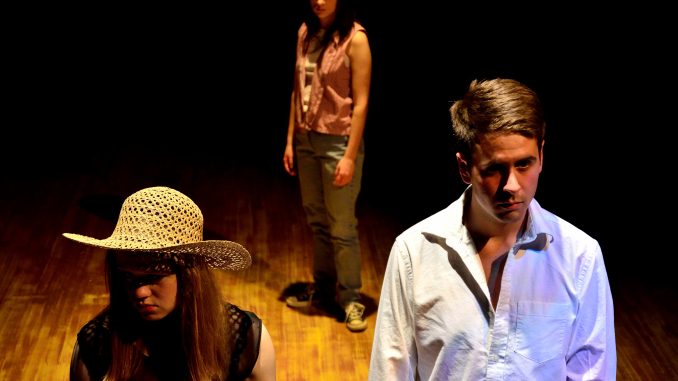
Michael Bonnani, Staff Writer
When a person goes to see a play, rarely is it an experience that makes one take a step back and think. Usually there are some impressive characters or dialogue and people generally remember the plot or some favorite lines. Few plays as of late delve into such commentary on the aftermath of what will be called “tragic celebrities” and the exploitation of them by the media.
In “After Ashley,” written by Gina Gionfriddo, a grizzly murder by a schizophrenic man in Maryland suddenly gains national attention after the 911 call by the victim’s son goes “viral” throughout the media. The son Justin Hammond, played by Billy Rothwell, becomes increasingly bitter and angry from both the murder and the media attention for about three years. The play mostly centers on Justin as he continues to cope with the event and his anger. He is also trying to deal with his father Alden, played by Robert Harris, who uses the exposure of the tragedy to promote his own beliefs. On top of this, a TV network also adds to Justin’s frustrations as they continue to shape the image of his mother into a hallmark card memory and everything she was against.
The strength of this play comes from the opening scene, when the audience actually gets to meet the mother Ashley Hammond, played by Caroline Curtis, and know what Justin knows. Rothwell did a great job at portraying an angsty teenager, and his personality from then on is believable; most conversations feel as uncomfortable as the characters portrayed in the play. The tension caused by the clashing of perspectives and the way all of the characters interact with Ashley’s murder is heavy. From every swear word, to every line of verbal abuse or façade, the intermission and the funny parts of the play are definitely welcomed for an audience needing to catch their breath.
“After Ashley” was a student run play, directed by senior Andrew Tejada, who worked with both talent and crew while maintaining his student life. “There is a process to go through to be a director,” said Tejada, “First you have to take three courses, that would be: stage craft, play analysis and directing…After you take those three classes you will present a project proposal and a full abstract of what you want to direct for the next upcoming season.” According to Tejada, the process is open to everyone as long as they take those classes. The play ideas are then chosen by the voting of campus theatre club Mask and Hammer. Tejada had chosen “After Ashley” after browsing through it in a drama bookshop, “It was in the top ten ‘you should read this this month list’…I picked it up, thinking nothing of it, and I just couldn’t put it down.”
The play is also very vulgar, with one of the taglines being “the word fuck is used 50 times.” “It’s a comment on what we do and how desensitized we believe we are to using language” Tejada said. The amount of profanity was just as much of a shock to the actors and actresses as it was to the audience. Tejada explained, “There was a lot of ‘I’m going to say this on stage?’…it was shock.” The play was very shocking, but it all started to feel like just another set piece as it went it. There was also a bit of raciness involved and it was done without interfering with the story. In fact, it played an important role and was not just there to shock or surprise the audience.
“After Ashley” was a great production put on by Mask and Hammer. The smaller size of the theatre actually played to the advantage of the performance. By having the audience really close, the intimacy and tension was enhanced to make an even better experience. The best part of the production was not only the portrayals of the characters, but that the play’s message was on point and relevant to the audience today. In our current society the “evil media” theme is ubiquitous, and “After Ashley” takes a more personal look at media in our society. Look out for the next production from SUNY Oneonta, “Of Thee I Sing,” starting Wednesday, April 24.
Leave a Reply